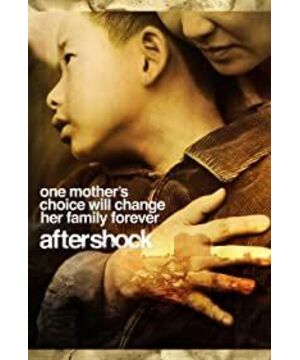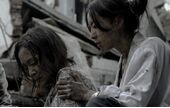"The Great Tangshan Earthquake" looks like a disaster film, but it actually tells a touching story of family love and healing of the trauma of the survivors after the earthquake. During the 23 seconds of the Tangshan earthquake disaster, the shaking ground, torn houses, screaming voices, and strong visual impact shocked people’s hearts. A young mother was in the ruins after the earthquake, a section of cement slabs. The elder sister who pressed the fetus of the dragon and the phoenix, the younger brother was pressed on the other end. The rescuer has only the potential to save one person. How will this young mother make a choice? This is a difficult problem left to human nature by this movie. Under the difficult choice of "only one can be saved", when Xu Fan's mother played helplessly and desperately yelled the words "help brother", the older sister who was under the reinforced concrete slab cried silently and whispered the last sentence " "Mom", also fell into helplessness and despair in the dark. The 23-second earthquake disaster brought about 32 years of life and death for a family. For the three of them, surviving is just the beginning of the story. This is destined to be an unsolvable problem. Mothers cannot escape the guilt of self-blame, and daughters cannot cope with the trauma of letting go of their mothers. The incomprehension there is not the incomprehension of the story, but the incomprehension of human nature. How can humans repair this distortion of human nature caused by disasters or suffering? This is a problem that Feng Xiaogang has always really dealt with when shooting this film. Father died, eyes closed forever; Although the mother and daughter are alive, the wounds in their hearts are always open. The tears that people leave in the cinema are not only for the mother and daughter, but also for the damage and distortion of life and human nature caused by the disaster. I shed tears while watching this movie. I haven't had this feeling of watching the movie for many years. But at the same time, Feng Xiaogang's best humorous element still exists: apart from his slight dissatisfaction with the placement of advertisements, his son's sentence "there are not lack of chickens, there are also eggs" is still making people laugh. But the movie is more about exaggerating the power of emotion, whether it is the grasp of the story, the rhythm of the picture, or the control of the audience's emotions, Feng Xiaogang has shown his skill. The disaster performance of the big earthquake is also handled appropriately. It not only constitutes a push and pressure for the development of the story, but also does not overstate. The film cares about how to make the audience put themselves into the protagonist’s emotions. Once echoed, When the shot is in sync, you will naturally go deep into the complex human world together with the protagonist. The tears that people shed are actually a purification of one's own humanity, but the impurities that cover humanity are flowing out. In the past 100 years, China has had too many sufferings and disasters, which have been hidden from people's memory. Apart from watching a domestic disaster film reflecting the typhoon in the past two years, there seems to be no disaster film worth remembering in China. People have almost forgotten how to use movies to express the harm of suffering to human nature. The loss of suffering in public discourse has caused more and more people to lose their potential to face misfortune and grief. Natural disasters and man-made disasters are unavoidable, just like "2012". Natural disasters have assumed an evil protagonist in the eyes of the world. In fact, whether it is a natural disaster or a man-made disaster, letting people who experience suffering speak out is not only a respect for the lives of those who suffer, but also means that the memory of those individual sufferings is transformed into a public memory that the people can use for self-education. It is actually a way for people to seek cultural identity. This kind of memory is the most important spiritual wealth for a nation. Because the deeper the memory of historical suffering, the more it can warn people to let this suffering happen again. When the Wenchuan earthquake occurred in 2008, the rescue scene shown in the movie was very different from the Tangshan earthquake. The attitude of the entire nation towards disasters has matured. Post-disaster spiritual reconstruction is a more important part than physical reconstruction. Premier Wen One sentence of "Big disaster rejuvenates the nation" tells the true meaning of it. The scientific level at this moment cannot accurately predict when and where such great suffering and disaster will occur. It often comes suddenly when people are unsuspecting, just like the Tangshan, Wenchuan, and Yushu earthquakes. People who are unwilling to deal with scars and suffering, but want to use this kind of more disability Cool way to deal with the awakening of history. The victims of suffering are not just the injured individuals, but the common humanity of all people. Therefore, the revelation and memory of suffering is also a kind of comfort and human pursuit of trauma. "Tangshan Earthquake" is such a fable. It uses a story with body temperature and blood and tears to show us the dignity of human nature under the weight of suffering. The lives of those who died will not return, nor will the youth of those who have suffered, but this kind of listening and witnessing of suffering will keep us awake to reality. In fact, in this age of numbness and confusion, to be a record and witness to the history of suffering is also a human action and duty.
View more about Aftershock reviews











